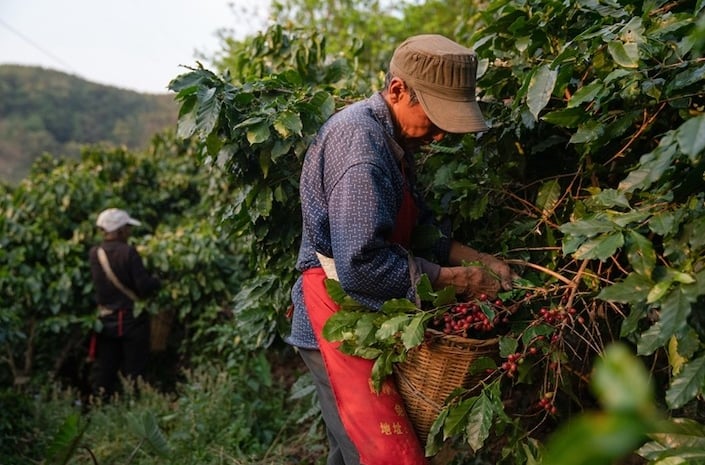Why green coffee price increase and no one is talking about
Uncover the hidden factors behind the green coffee price increase, focusing on China’s growing influence in the global coffee supply chain and its implications for the industry


Let's start by saying one thing: the coffee market is a minefield, and I'm not talking about the usual price fluctuations or climate cycles that disrupt production. There's something deeper and more complex at play, something many have yet to grasp.
And, incredibly, few (if any) are talking about it. So, here we are to unveil the mystery.
Coffee farmer Li Faneng and wife Luo Dafeng pick coffee cherries in the fields of Nanping Town, Pu'er City, Yunnan Province.
Here's what I see on the horizon: “The new normal”
And here we reach the crucial point, the real crux of the matter. In the long run (but not too long), the price of green coffee will rise. Period. And it won't return to previous levels. Indeed, we could consider this the new standard.
Why? Because demand isn't just higher; it's more strategic, more interconnected with global geopolitical and financial dynamics.
I feel compelled to tell my fellow roasters: don't hope for a return to normal. This is the new normal. This is just the beginning of a new era: green coffee will be precious and especially scarce for us Europeans.
So, don't say I didn't warn you. The future is now, and someone in China has already started writing it... while sipping a cup of tea, maybe.


The implications are many, and change is inevitable.
But let's see together what all this means for the coffee market:
1. Shift in power dynamics
China's growing influence will reduce the bargaining power of traditional buyers like the United States and the EU. A new world order of coffee, so to speak.
2. Price pressure
Increasing Chinese demand, combined with climate-related production challenges, will keep coffee prices high in the medium to long term. It's not a matter of "if," but "when."
3. Supply chain transformation
Chinese investments will accelerate the modernization and vertical integration of coffee production in Brazil and other producing countries.
4. Geopolitics
The commercial ties between China and Brazil will have repercussions on international relations, particularly with the United States. It's a chess game we're just beginning to see.
5. Opportunities for farmers
Despite the challenges, Chinese interest could bring the necessary capital and know-how to tackle climate and production difficulties. A breath of fresh air for many growers.
6. Evolution of consumption
The rapid growth of the Chinese coffee market, driven by young consumers, will influence global consumption and production trends.
“Less coffee for other major importers, United States and Europe”


Photo: Bryon Lipponcott for YCT
Photo: Bryon Lipponcott for YCT
